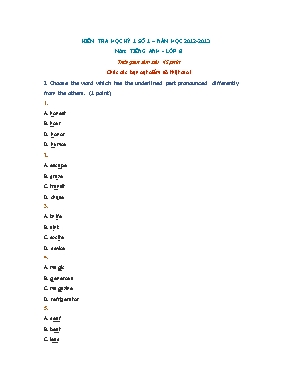Đề kiểm tra học kỳ số 1 môn Tiếng Anh lớp 8 năm học 2012-2013
Bạn đang xem tài liệu "Đề kiểm tra học kỳ số 1 môn Tiếng Anh lớp 8 năm học 2012-2013", để tải tài liệu gốc về máy bạn click vào nút DOWNLOAD ở trên

KIỂM TRA HỌC KỲ 1 SỐ 1 – NĂM HỌC 2012-2013 Môn: TIẾNG ANH - LỚP 8 Thời gian làm bài: 45 phút Chúc các bạn đạt điểm số thật cao! I. Choose the word which has the underlined part pronounced differently from the others. (1 point) 1. A. honest B. hour D. honor D. humou 2. A. escape B. graze C. transit D. chase 3. A. knife B. sink C. excite D. device 4. A. magic B. generous C. magazine D. refrigerator 5. A. deaf B. beat C. lead D. teach II. Choose the best answer A, B, C or D. (2 points) 1. After a month, Hoa got used to ________ in her new school. A. study B. studying C. studied D. is studying 2. Last Tuesday her son was absent from school _______ of his illness. A. because B. instead C. though D. but 3. The children ______ to go at once. A. will B. had better C. must D. have 4. My brother feels ________ again after his operation. A. strongly B. strength C. strong D. enough strong 5. The English course begins ______ May 9 th, and ends sometime ______ September. A. on/in B. in/on C. at/on D. in/at 6. I _______ to go out when I was in the countryside. A. not used B. wasn't used C. didn't use D. wasn't using 7. The party was great and we enjoyed ______ very much. A. weselves B. usselves C. ourself D. ourselves 8. I used to live _____ a farm and look ______ my younger brother. A. in/after B. on/after C. in/out D. on/out 9. Tuan hates _____ computer games all day. A. play B. to play C. playing D. plays 10. Your son isn't tall ______ to be a good basket ball player. A. too B. very C. so D. enough III. Supply the correct tense of the verbs in brackets. (3 points) 1. When we (be) small, our family (live) in the countryside. 2. - Miss Trang is in hospital. - Yes, I know, I ( visit ) her tomorrow. 3. I (read) an interesting book at the moment. 4. Look at those black clouds. It (rain) . 5. I (not invite) her to the party because I (forget) her phone number. 6. Look! Our new teacher (come) . She (have) long black hair. 7. They (work) very hard when they (be) young. 8. We (have) a small party next Sunday. Would you like ( come) ? 9. Last year my brother (spend) his summer holiday (do) volunteer work. IV. Supply the correct forms of the words in brackets. (2 points) 1. He fell off the bike, but his were not serious. (INJURE) 2. Mr. Phong made an to see us at two o’clock. (ARRANGE) 3. The shop showed me a lot of news models. (ASSIST) 4. She’s beautiful with a smile. (LOVE) 5. You shouldn’t talk about her character only through her . (APPEAR) 6. The of television made Alexander G. Bell famous all over the world. (INVENT) 7. We’re worried about the of the children. (SAFE) 8. Some of my are going to my birthday party. (CLASS) 9. You must put all objects out of children’s reach. (DANGER) 10. The prince and the poor girl had a happy . (MARRY) V. Read the text carefully and choose the best option to answer the questions below. (2 points) Learning English Every year students in many countries learn English. Some of these students are young children. Others are teenagers. Many are adults. Some learn at school. Others study by themselves. A few learn English just by hearing the language in films, on television, in the office or among their friends. But not many are lucky enough to do that. Most people must work hard on their lessons to learn another language. Many boys and girls learn English at school because it is one of their subjects. They study their own language, mathematics and English. In England, America or Australia, many boys and girls study their own language, which is English and another language, perhaps French, German or Spanish. Many adults learn English because it is useful for their work. Teenagers often learn English for their higher studies because some of their books are in English at the college or university. Other people learn English because they want to read newspapers or magazines in English. 1. According to the writer: A. English is useful only to adults B. only teenagers learn English C. no children like learning English D. English is learnt by many generations 2. Most people learn English by __________. A. watching videos only B. talking with the film stars C. hearing the language in the office D. working hard on their lessons 3. Many boys and girls learn English because __________. A. English can give them a job B. they have to study their own language C. it is included in their study courses D. their parents make them do it 4. In America and Australia, many school children study __________. A. their own language and no foreign language B. such foreign languages as French, German or Spanish C. English and mathematics only D. English as a foreign language 5. Many adults learn English because __________. A. they want to go abroad B. it is useful for their work C. most of their books are in English D. they want to read newspapers in English
Tài liệu đính kèm:
 de_thi_hoc_ki_1_mon_tieng_anh_8.doc
de_thi_hoc_ki_1_mon_tieng_anh_8.doc





